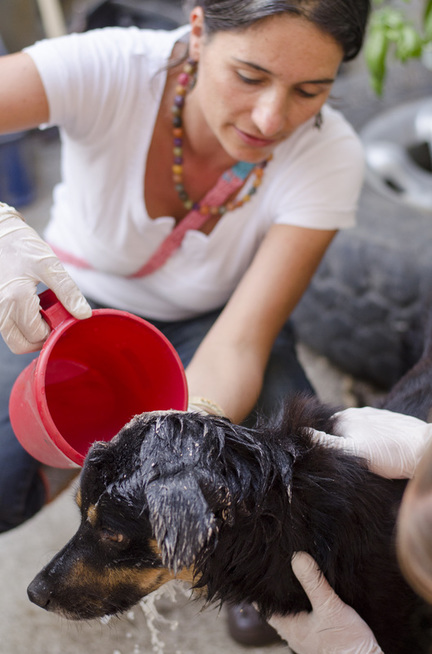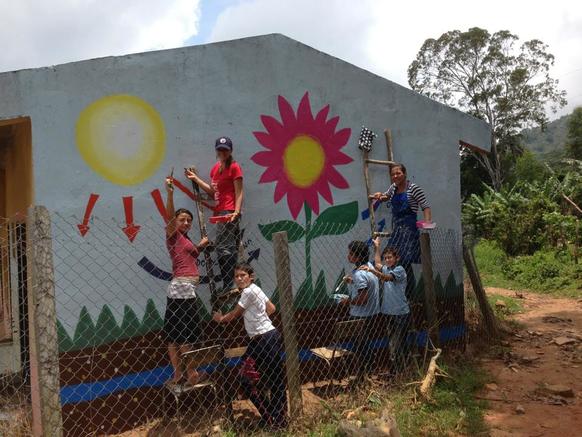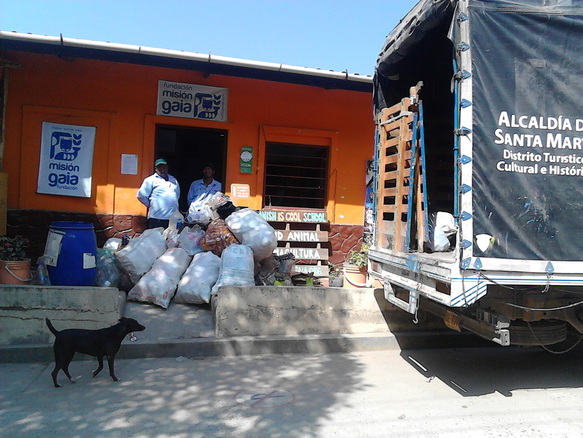More about Colombia Positiva here |
A Place That Honors Cats, Dogs, and Mother Earth
By Ilonka Wloch
PN: Can you tell us a little bit about yourself? Diana: I’m a person who is sensitive to nature and to the critical situation of the world at this time. I came here for the magic of the Sierra Nevada de Santa Marta, the cultural and biological diversity it contains, and the spiritual dimension that the indigenous communities contribute. [My work] is a labor that demands much effort and dedication, but it’s inspiring and interesting to motivate others to get involved in these issues. PN: What is Misión Gaia? Diana: Misión Gaia is an ensemble of efforts of many people who want to see change, who want to connect themselves more with nature and raise the quality of life of the place where they live. In official terms, it’s a non-profit organization that has three programs to serve its mission, which is to promote the responsible use of natural resources and improve the quality of life of the people. [They include] animal health and well-being, the sustainable development of tourism, and education for sustainability. Everything turns around the axis of education, and all our programs have an educational component. PN: And underneath the official mission of Misión Gaia, what is its spirit? Diana: I would say to create consciousness. The problems are sometimes very large, and what we do is like putting one grain on the pile, right? Sometimes you can’t cure but a little. It’s a beginning, but you can’t solve everything, because there’s a lot going on. To create consciousness and sow seeds, plant seeds in the children, in the volunteers, and in our friends. This will create change. Just to be conscious that each of us can do something more to change the situation. PN: Can you share two highlights of your work?
Diana: For me there are some really important things, like, how emotional the children in town are when they see me and recognize me and visit the office with the desire to learn. They see in Misión Gaia or in me something that gives them hope, that motivates them. To me, this is valuable, because I believe that changes come with the education of the children. For another thing, the work with the animals seems very special, because animals, more than humans, are receptive and sensitive. When you help an animal, it is very loyal. And to see the results with the strays on whom we’ve operated, to see how they change in the community, is gratifying. PN: How many animals are you able to help every year? Diana: To date we’ve sterilized over 1050 animals in four years. The figure is low, but it’s a lot given our lack of resources. Our goal is to do 500 sterilizations per year. Normally we attend to an average of between 400 and 500 [animals] per year, including medical consultations and treatments. PN: If you could have three wishes come true, what would you ask for? Diana: I would like us to learn to use and conserve water better. This is very important. More respect from each of us towards ourselves, towards others and towards our environment. And last, I would think to find the way to leave less negative impact on the environment, because I understand that sustainability is an impossible task given our current way of life. PN: What advice could you give to our readers who would like to create change in the world?
Diana: Begin with your lives. And be conscious. PN: What would be your vision for the village where you live? Diana: For the community to be more united. More unity to be able to make decisions that benefit first of all the locals, to satisfy their needs, because obviously we have needs. And only then to satisfy the needs of the tourist. So the needs of the tourist or the private sector are not prioritized over the needs of the townspeople – which is what is happening now. PN: What is something significant you learned in your life thanks to Misión Gaia? Diana: Many things. Every day I learn something. The importance of good communication. Observing before acting. Sometimes you arrive in some community, and you think, “this is lacking, and this, and this is necessary,” and when you begin to talk with people, you realize that, no, those things are not important to people here. And until there’s consciousness and understanding that something is important, you’re not going to generate any change. You can’t go against the community, against the current. Each one has its own process, its own form of moving with the world. From my experience as a volunteer, I would add that it’s gratifying to give back for what I receive. Not just because I know I’m going to receive something — because nature, life, is generous — but because the act of giving can be so gratifying! And to persevere with your ideas, your dreams. More Information: |
Why Positive News?
to Nurture Hope to Exemplify Solutions to Inspire Action to Celebrate Positive Change! We envision a world in which people treat each other with respect and kindness, where we consider the Earth to be our home to care for and to enjoy. And we see that this world is in the process of emerging. Positive News is a reflection of this widespread movement and tells its powerful stories.
|





